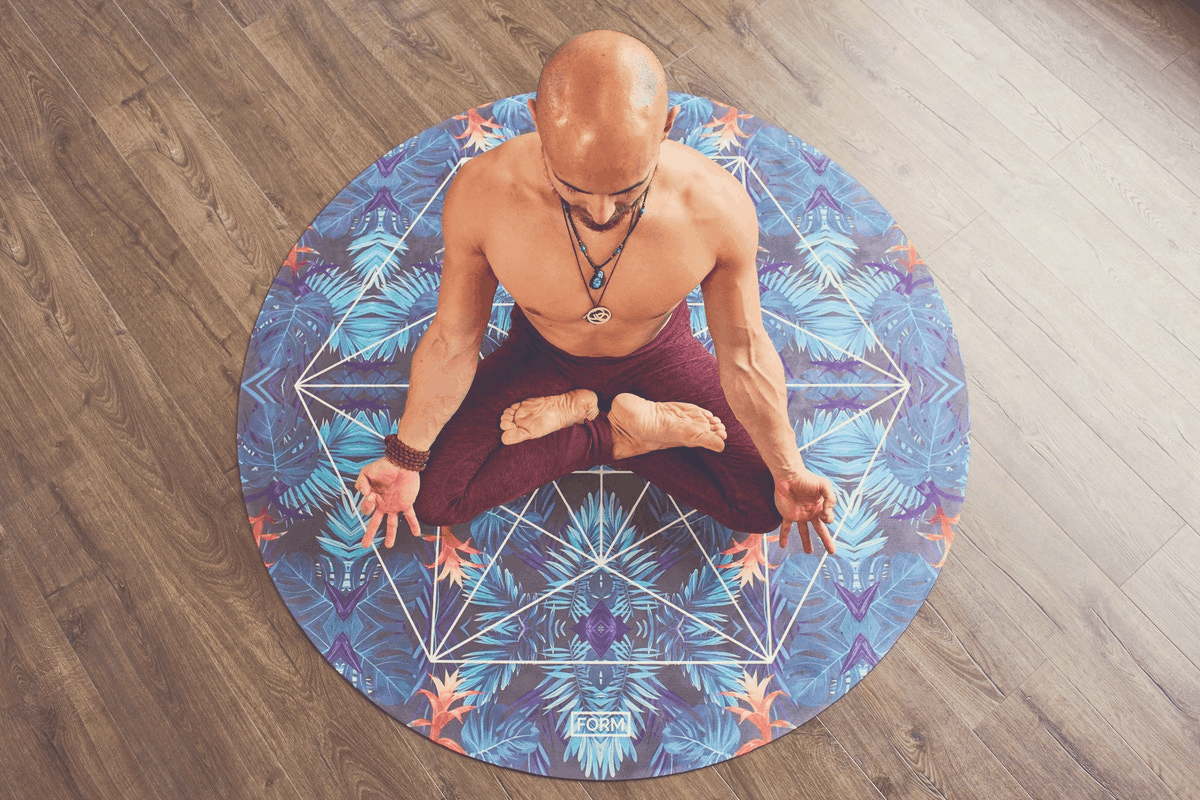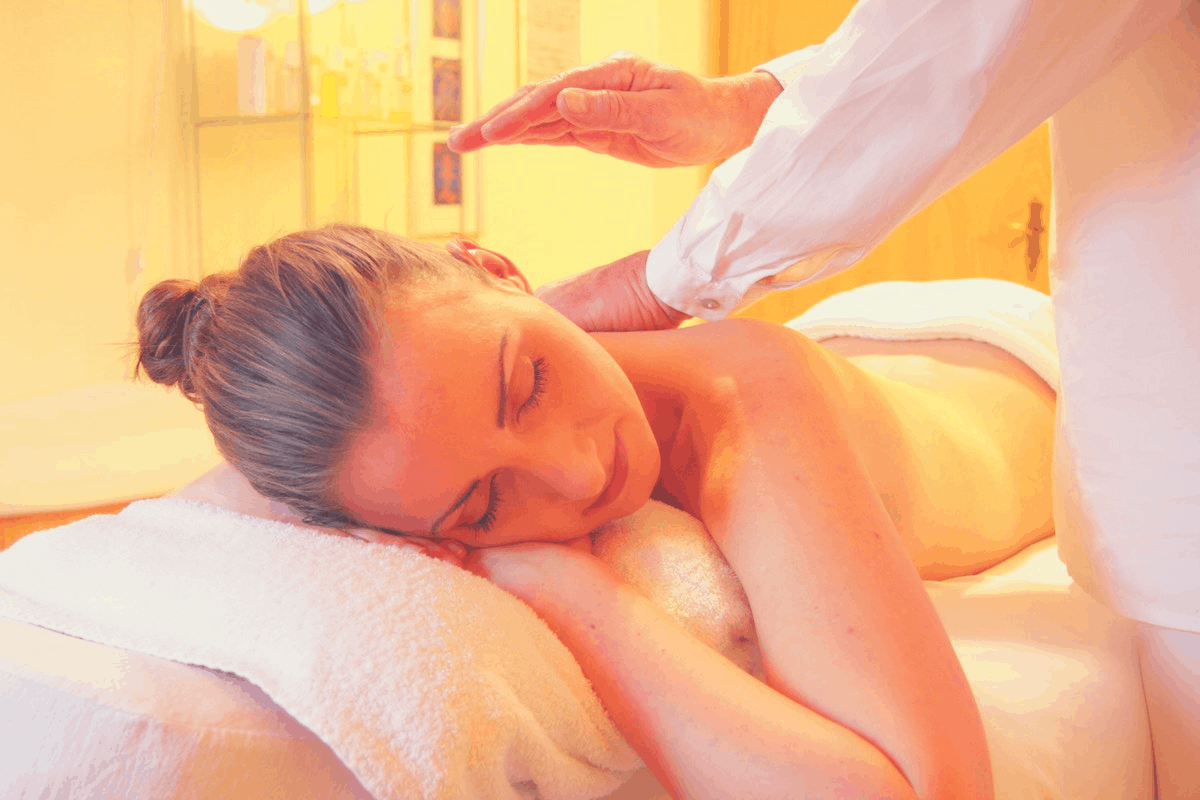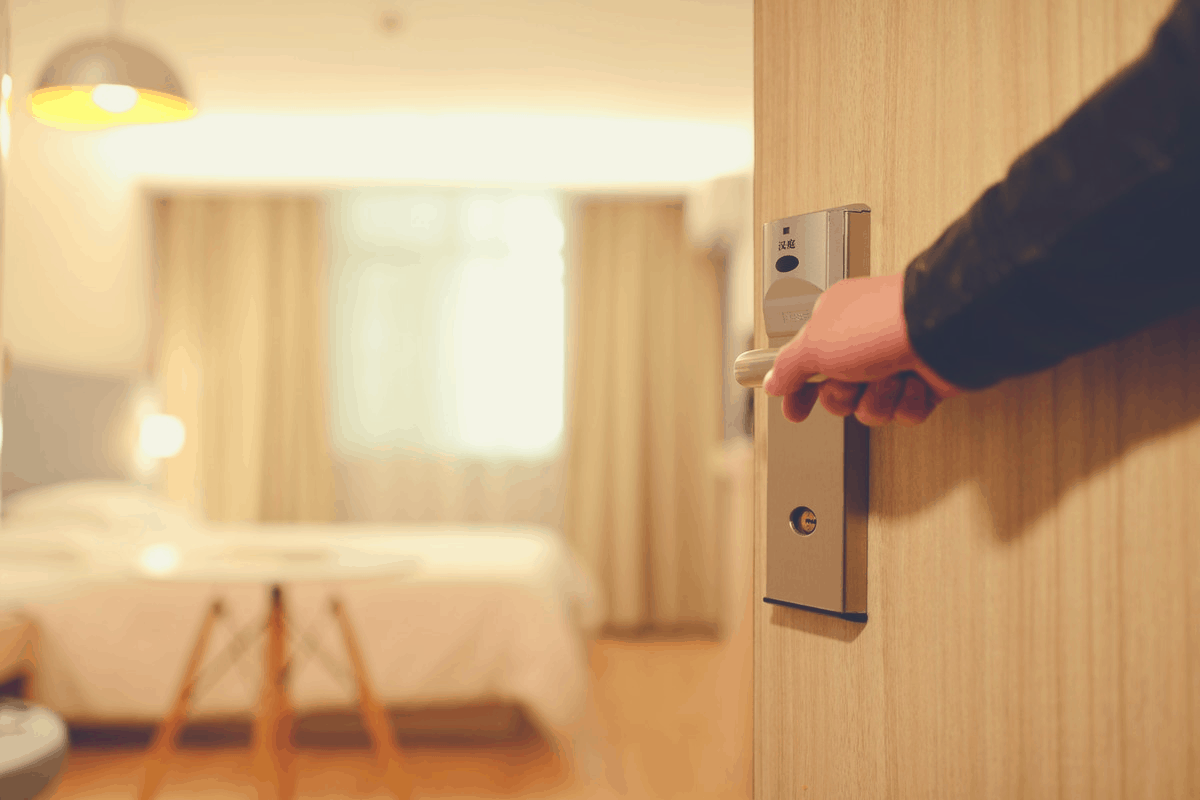Do you frequently lie awake at night with invading thoughts that cause repeated tossing and turning? You’re not alone. Millions of people from all walks of life experience sleep disturbance regularly due to excessive levels of stress.
With the daily pressures of modern-day life coupled with the desire to stand out from our peers on the social ladder, it is not difficult to see why many of us struggle to sleep. If you’re on the cusp on insomnia due to unbearable stress, know that all is not lost.
There are tried and tested techniques that can give you a trouble-free mind at bedtime. This should enable drifting off to Dreamland wherever and whenever without any problems.
How to Sleep When You’re Stressed
What techniques can you employ to calm down the mind and set up the body to sleep?
1. Exercise Regularly

Regular exercise is one of the best ways to destress after a long hard day. Even the lightest physical activity can help the body combat fatigue by setting it up with the right conditions to achieve good sleep.
Working out may also release happiness hormones known as endorphins that can make you feel good. According to WebMD, endorphins may trigger a positive feeling similar to morphine in the body. This can improve moods and reduce your anxiety levels.
Another positive effect of regular exercise is an improvement in your self-esteem. Most people say regular exercise provides a feeling of invincibility. This improved self-image can offer lots of confidence which may significantly dip your stress levels.
Getting the right amount of shut-eye at night should become much easier afterward.
2. Yoga
Think you have to be a supermodel with flexible reflexes to practice Yoga? Well, you’ve got another think coming. Most people achieve better sleep just by doing a couple of stretches right before bedtime.
These techniques can calm the mind from even the most troubling issues in life. The result is amazing nighttime rest beyond imagination.
There are lots of simple Yoga videos online for you to sample at pleasure. These videos can range from a complete beginner target audience to more advanced practitioners.
Try Yoga today and experience an upturn in your sleep fortunes.
I use the Body Quiet Meditation Cushion with Accupressure For Stress Relief from Amazon for Meditation and Yoga exercises. The seat is tall for excellent alignment of the hips and spine for correct posture. This means zero pressure on my back, knees, and ankles for superior comfort and longer, pain-free meditation and yoga sessions. I highly recommend it.
3. Soak up the Sun
If you’re serious about relieving the body of stress, soaking up the sun can be a great idea. Studies show that it can ramp up the body’s production of serotonin, a hormone that may improve moods and supercharge the process of de-stressing.
Maintaining a good mood calms down the mind to focus on more important things. Since a disturbed mind is likely to stay awake at night, spending some time in the sun can be great for your overall mental well-being.
This is the reason why vacationing after working for several straight months can be so positive for the body.
4. Essential Oils
Aromatherapy is a tried and tested technique used across different cultures for centuries. Lavender, Jasmine, and Vanilla can promote not only physical benefits but mental and emotional wellness as well.
For instance, Lavender has been found to offer sedative effects to the body meaning inhaling it can directly put you to sleep.
Aromatherapy may also increase sleep quality by lowering hyperactivity and restlessness at bedtime. It can also reduce the body’s blood pressure while providing relief from anxiety and stress.
Essential oils can also supercharge daytime alertness to ensure quick sleep immediately after arriving in bed.
5. Meditate

Meditation can be an effective sleep remedy when the body is under severe stress. Even 10 minutes of meditative practices have been found to control stress. Meditation may also help you relax the mind and focus on more positive aspects of life.
The benefits of meditating daily include the ability to train the mind to achieve a deep state of relaxation. It can also allow anyone to ignore worrying thoughts and focus on more the gifts and blessings life may have offered to him or her.
Additional positives may include relaxed moods, reduced blood pressure, and improved digestion. Even if you’re a complete novice, the time to start practicing meditation is now.
The good news is that there are tons of resources on the web that can transform anyone from a beginner to intermediate within a few weeks of consistent practice.
Have you checked the article on Sleeping vs Meditation? Click the link for the comprehensive guide that reveals the core differences between the 2 mental states.
6. White Noise
White noise describes highly pleasant sounds that can drown out any background noises in the bedroom. People who live in noisy apartments report amazing effects of these sounds on their sleep after adopting this technique.
Popular sources of white noise include slow relaxing music as well as the sounds of an oscillating fan’s blades. A quick YouTube search will reveal samples ranging from thunder to rainfall as well as other relaxation sounds.
Many of us are introduced to the relaxing effects of white noise at infancy when parents and other adults incorporate lullabies into our sleep routines. Hence, we grow up subconsciously wired to relax and nod off upon hearing pleasant sounds.
No wonder many of us achieve the most memorable nights of sleep when it rains heavily at some point in the night.
7. Get a Massage

What do Swedish, Deep Tissue, and Therapeutic massages all have in common? They can actively reduce a person’s stress levels.
These massage techniques touch on the deepest layers of the body and reduce the tension in the muscles. The result is the free flow of blood, oxygen, and other critical body nutrients.
Massages can also reduce stiffness and pain which can lead to positive responses for fatigue and other conditions that may result from accumulated stress.
Besides, spending time with a skilled masseuse can also increase the body’s relaxation levels and this is why it remains one of the most popular solutions doctors recommend for patients suffering from stress-induced insomnia.
8. Clean Your Room
A dirty room may be one of the most common stressors that can deprive anyone of much-needed sleep. Even the heaviest sleepers report difficulties when they find themselves in dirty, dusty, and funky smelling bedrooms.
The dust and dirt can affect the quality of air available meaning tasks as simple as breathing can feel next to impossible.
A clean and fresh bedroom can be an attractive proposition for even hard-core insomniacs. By the time you retire to bed, the atmosphere can be enchanting to the point where sleep happens in no time.
Even if you’re unsure, just deep clean the bedroom as soon as possible and measure the difference in the quality of slumber.
9. Change Your Sheets
Have you noticed how mesmerizing a fresh pair of bedsheets smell? The feeling alone can deliver deep relaxation for the mind.
Often, many of us lie down on the same sheets for weeks on end. This can lead to a pileup of dust mites, dead body cells, dirt, and other unfavorable particles. Unfortunately, these foreign objects can directly affect the ability to fall and stay asleep as well.
Thus, changing bedsheets regularly can boost not only your sleep quantity but the quality as well. In most cases, the introduction of new sheets can also be therapeutic for the mind because the brain can sometimes get tired of doing the same thing over and over again.
10. Change the Position of Your Bed
As stated above, there are times when the human brain requires something new to destress. You may not be able to change much in the bedroom but switching the position of the bed can do wonders.
Try to find a spot that allows you to receive as much fresh air as possible. If you live in an apartment where the morning sun hits the face directly, this change of position can be great. It can also allow switching of the bed to a spot with little risk of the sun’s rays in the morning.
This should provide the freedom to sleep in after a stressful workweek.
11. Spend The Night in a Hotel or Different Surroundings

Spending the night in a different environment can be a great way to boost moods and reduce stress levels. If your home has become less than ideal for nighttime rest, one of the best ways is to recalibrate the brain by staying in a hotel for a couple of days.
After that, you can return home to a bedroom that feels like new. This should promote good sleep due to the genuine feeling of happiness in the “new” surroundings.
If going to a hotel does not sound like a viable option for one reason or the other, you can try sleeping in the guest bedroom. Sometimes, even lying down on the couch for a few days can result in superior sleep by the time you return to the bedroom.
12. Get Fresh Air at Bedtime
Are you feeling stressed and struggling to sleep as a result? Getting a dose of fresh air just before bedtime can be extremely rewarding. After all, few things in nature can offer as much relaxation as fresh air.
The feeling of a cool natural breeze on the body can promote the release of feel-good hormones that may lead to sleepiness. Besides, fresh air can have a cooling effect on the body, which can be a surefire way to catch some Zzz.
According to Natalie Dautovich, Ph.D., a researcher at the National Sleep Foundation, the drop in temperature from the fresh air can also cause slight tiredness. Thus, you’re able to nod off much quicker and get a quality amount of shut-eye.
13. No More Mid-day Naps
Regular mid-day naps are common among those suffering from depression. However, they can increase the risk of suffering insomnia at bedtime in many ways.
Firstly, taking long naps in the middle of the day can disrupt the internal clock mechanism to the point where the brain has no idea when to retire and when to keep you awake.
This may lead to tossing and turning for several hours before sleep can become a reality. Since you’re only able to get a few hours of shut-eye at night time, you’re forced to nap again during the day.
Thus, the cycle of sleep disturbance continues running over and over again. If you must nap during the day, keep it under 30 minutes.
Have you read our guide on the 21 Ways To Stop Sleeping During Daytime? Click the link to read the full article.
14. Get Freaky With Your Partner
Bedtime sex can be another great way to lower stress levels and drift of into La La Land. It is widely known that sex is one of the most potent remedies for stress as it promotes the release of endorphins that may enhance moods and make you feel good.
Sex can provide soothing pain relief from a wide range of conditions including those annoying cramps. The exhaustion from sex can also calm you down after a stressful day since it is one of the most rewarding exercises available.
Besides, sex has also been found to help maintain blood pressure even during significant levels of stress. This may not only promote good sleep but can lead to a higher libido and improved overall health.
15. Go Camping

Have you ever spent time out in nature? Savoring the scenery in the outdoors can be mind-blowing in so many ways. It can also offer superior mind relaxation leading to other transformative effects.
Imagine waking up to sunrise or watching the sunset peacefully in the middle of nowhere? Such experiences can destress the mind and put anyone to sleep even before they know it.
Even if spending a few days in the wilderness is not an option, hiking for a couple of hours can be great for your mental well-being.
Additionally, walking in the wilderness may not only provide amazing physical benefits for the body but it can also allow you to sleep better at night time.
Thinking about going camping? Check out the Ultimate Guide to Sleeping in A Car to find out tips to transform your car into a sleeping paradise.
16. Quit the Caffeine
The smell and taste of a cup of freshly brewed coffee in the morning may be one of the reasons to wake up. It can deliver an energy boost that sets up the body for the day ahead.
However, drinking more than 4 cups of coffee daily can lead to negative side effects including distorted sleep at bedtime.
Firstly, excessive caffeine can inhibit the body’s release of adenosine, a hormone that produces a calming effect on the body. Caffeine can also offer an adrenaline rush that can make you feel tired and depressed in the long run.
Besides, drinking too much coffee throughout the day can also cause the body’s cortisol levels to surge. This can make you moody even at the slightest provocation.
Love to drink coffee all day? Click here for the article we wrote on the Top 10 Tips to Sleep After Drinking Too Much Coffee.
17. Drink Chamomile Tea
Drinking chamomile tea can provide satisfying sleep for even the most serious insomniacs. This is because Chamomile offers natural anxiety-reducing properties that can calm down the mind thanks to the presence of the antioxidant called Apigenin.
Apigenin operates by binding some of the most important receptors in the brain for relaxation and sleep initiation.
If you’re overly stressed and struggling to sleep, drinking chamomile tea after dinner can quicken the snoozing process.
The truth is chamomile’s sedative effects can be so powerful that it is regarded as some sort of tranquilizer across many cultures.
18. Quit the Alcohol
After a long stressful day, many of us instinctively reach for a bottle of alcohol. The truth is while you may feel relaxed from drinking in the short-term, alcohol can worsen stress levels over time.
This is because alcohol may mess with the neurotransmitters in the brain that regulate positive mental health over the long-term. This explains why alcoholics generally suffer from depression and other mental health problems.
Besides, drinking typically dehydrates the body and increases thirst levels. This can force you to drink more water which increases the urge to pee after every 30 minutes or so. Getting up several times for bathroom visits can make it even harder to hit the hay.
19. Turn on the TV

Watching TV may be one of the best ways to reduce stress especially among women. According to this study, the higher the amount of time spent watching TV, the lower a woman’s cortisol levels.
Elevated levels of the powerful stress hormone can lead to not only high degrees of stress but related conditions ranging from high blood pressure to insomnia too.
Fortunately, there are lots of shows and programs on TV that can promote relaxation and reduce stress levels. You should be able to sleep much quicker after seeing your favorite. Just be careful not to binge-watch as that can lead to staying awake way past your regular bedtime.
20. Accept the Things You Cannot Change
Stress often occurs as a result of one seemingly overwhelming problem or the other. This can lead to restlessness and excessive levels of anxiety.
One of the best ways to battle stress is to accept things that are out of your control. This can make it easier to go through life without taking everything too personal.
Often, letting go of the things you cannot change and focusing on those under your control can be the secret to a happier life.
It can also help calm down the mind by lowering stress levels and giving you better moods. This should lead to positive effects on your sleep and overall life quality.
21. Prioritize
Many of us are unable to sleep because we feel like we have the whole world on our shoulders and have to worry about too many things. This may not only cause unhealthy levels of anxiety but can also affect productivity levels.
This is why it is important to prioritize your commitments at any point in time. Understand that you cannot do everything at once and setting smaller achievable targets one at a time can work well.
The result is fewer responsibilities on the shoulders and the ability to relax after a long day. In the long run, this can help spike up confidence levels as you hit target after target with consistency.
22. Set Personal Time for Yourself

If you’re committed to reducing stress levels, it is critical to set regular personal time for yourself. For instance, you can decide that no matter how busy the day gets, the last 2 hours before bedtime is reserved for activities that can improve your well-being.
This can mean taking a walk after dinner or pampering yourself in the bathtub before bedtime. Whatever you decide to do, make sure it can provide an adequate level of body and mind relaxation.
By the time you retire to bed, you could be so calm that you’re already dozing off and yearning to reach La La Land.
23. Talk to Your Family and Friends
Are you having trouble in your relationship? Or are you finding it difficult to focus at work due to one issue or the other? If the answer is yes, keeping those problems to yourself can aggravate stress levels.
This is why it is important to talk to the people in your inner circle. Discussing the underlying causes of your stress and seeking their opinions on the best way forward can be rewarding.
Not only can this help you come up with quicker solutions, talking about stressors alone can be therapeutical too. You’ll be amazed at how much your sleep will improve afterward.
24. Talk to Your Doctor
If you’re stressed beyond control, talking to a psychiatrist can be a game-changer. It is not uncommon to come across people who may be extremely stressed yet struggling to find out the underlying reasons.
A few appointments with a Shrink can help you figure out the underlying reasons behind those troubles.
This can speed up the ability to come up with solutions. Besides, your doctor can also recommend a wide range of treatment options to help calm the mind.
Talking to a psychiatrist can be lifesaving in many ways so do not hesitate if you’re overly disturbed to the point of insomnia.
25. Sleep Aids
If none of the techniques above is working, it is time to consider alternatives. There are lots of over the counter sleep aids that can calm even the most stressed minds and enhance sleep. This may include Aleve and Benadryl.
Other popular sedatives include:
- Melatonin Supplements
- Valerian Roots
- Unisom Pills
Whatever option you choose, know that these supplements do not mix well with alcohol. Also, make sure not to make sleep aids the default method of combatting stress as this can lead to a wide range of side effects.
What is Stress?
Stress is the feeling of losing control when you’re under severe pressure from one situation or the other. It is not always doom and gloom as stress can also help you make smart in the heat of the moment decisions that can be critical to survival in many cases.
However, stress starts becoming detrimental when it occurs frequently or over the long-term and begins to feel overwhelming.
The symptoms of stress can be either physical or physiological depending on the situation at hand as well as the individual involved.
Experience may help people deal with stress in many situations but other techniques can be relied on to dig your way out of it as well. Following these techniques can be beneficial for not only your mental well-being but the physical state as well.
How Does Stress Affect Sleep?
It is no secret that there’s a strong relationship between stress levels and sleep. When you’re completely relaxed, dozing off comes naturally with little effort and vice versa. This is proof of the relationship between stress and sleep.
According to studies, stress can trigger the “fight-or-flight” mechanism which typically pushes the brain to release hormones that prepare the body to either stay and face the situation head-on or flee to safety.
This involves the body’s sympathetic nervous system signaling the adrenal glands to release adrenaline and noradrenaline. The release of these 2 chemicals may lead to a surge in the person’s blood pressure, heart rate, and pulse.
Can you imagine falling asleep while your blood pressure, pulse, and heart rate levels are going through the roof? These conditions can force the body to stay alert which means absolutely no chance of dozing off no matter how much you may want to.
Unfortunately, the body has no way of differentiating between the stress of being under an armed robbery attack and losing your wallet after eating in a restaurant. The brain treats all stress levels the same and prepares for it by triggering the release of the hormones stated above and other associated actions.
This is why even the smallest stressors can keep us awake even when our lives are not necessarily in danger.
Common Stressors that Inhibit Sleep
Several stressors can stand in the way of getting that satisfying sleep you deserve after a long hard day. Shall we take a look at a few of them?
1. Financial Problems
This is probably the number one cause of stress-induced insomnia among adults all over the world. Problems ranging from bankruptcy to the loss of investment can keep you watching the bedroom ceiling all night long.
The situation can become dire when you’re in debt and facing mounting pressure from creditors. Foreclosures are another major source of stress that can put a strain on the ability to sleep.
The thought of losing your dream home due to financial problems can make anyone feel like they failed in life. This can make good sleep a luxury you may not be able to afford.
According to studies in the UK, two-thirds of workers reported skyrocketing levels of stress during the 2008 Credit Crunch.
2. Work

Have you suffered a recent job loss? The uncertainty surrounding when and if you can get another one can put all of us under severe stress. Even if you’re not in dire financial straits, the feeling of doing nothing all day can mess with the head.
You may find sleep suddenly hard to come by even if insomnia has never been an issue in the past. If you’re in employment, the demands of the job can also stress you to the point of getting little to no sleep.
From unrealistic targets to threats of losing your job, good sleep might be impossible to achieve due to these external pressures. No wonder many employees say they’re unable to sleep on the eve of an important presentation at work.
Have you read the article we wrote on the 21 Crazy Ways to Stop Sleeping During Working Hours? Click the link to check it out yourself.
3. Relationship Problems
Problems with your significant other can also affect the ability to catch some shut-eye at night. Whether intimacy levels have dipped or you’re communicating less, the majority of us sleep better when our relationships are blissful.
Others can become paranoid that their partners may be cheating or may have found someone else themselves and wondering whether to leave their current relationships.
Either way, relationships require heavy emotional investments. This can cause significant levels of stress when things do not go well.
Besides, the heartache from divorces and separations can also stand in the way of satisfying nighttime rest. With the mind racing over where you may have gone wrong to the uncertainties of what the future may hold, it is no surprise that insomnia usually creeps up at bedtime.
4. Illness
Being diagnosed with a serious medical condition may cause an enormous amount of stress. This can become even more critical when it is a potentially fatal or life-changing disease. For instance, can you imagine nodding off peacefully after recently being diagnosed with late-stage cancer?
With all your dreams shattered and constant worries about how long you may have left, sleep could be the last thing on the mind.
Even if you’re not personally sick, being informed of a friend or relative’s serious illness can impact stress levels negatively. The thought of living life without the person coupled with the desire to offer the best end-of-life care can all be significant sources of stress.
5. Pregnancy/Parenthood

Pregnancies can be both exciting and stressful. From the mood swings to constant anxiety about the health of the fetus, your stress levels can surge to the point where getting any amount of sleep seems impossible.
The situation may compound after delivery when new parents are trying to adjust to the baby. Also, many newborns struggle to sleep peacefully at night meaning the parents are forced to stay awake too.
Such issues can also ramp up stress levels and prevent you from getting the right amount of shuteye.
No wonder sleep experts worldwide cite the pressures associated with becoming a new parent as a major cause of insomnia.
Have you seen the article we wrote on the 21 Easy Sleeping Tips For New Parents? Click the link for some insane insights.
6. Excessive Noise
Do you live in an extremely noisy apartment or share a bed with loud partners? If the answer is yes, the stress from processing the noise can make sleep difficult to catch.
This is common among college students living in dormitories as well as those who reside in city center apartments. It can take sometime before your body adjusts to being able to relax in that level of noise for effective sleep.
Sure, slow tempo music may enhance peaceful night slumbers but if you live in a place with loud banging music, the quality of nighttime rest can suffer significantly. This is one of the reasons why many couples move to the suburbs when they’re ready to start a family.
7. Excessive Heat
Excessive heat may be another huge stressor that can stand in the way of good sleep. When temperatures soar, the body responds by producing sweat to keep you cool. However, sweating can be extremely uncomfortable despite the genuine benefits it provides for our health.
Have you noticed somebody sweating profusely in an airconditioned room when under severe pressure? This is because sweat glands can become heightened when under significant stress. No wonder many of us feel uncomfortable shaking hands when nervous.
8. Sleeping in Unfamiliar Surroundings

If you’ve ever tried hitting the hay in unfamiliar surroundings chances are it didn’t go too well. This may be because the human body takes time to adjust to new surroundings. The uncertainty over safety can cause the release of high amounts of adrenaline and noradrenaline.
This can force the body to stay in a state of fight-or-flight mode for extended periods through the night. And as noted above, good sleep can be impossible while the body remains full of adrenaline.
Have you read the article we wrote on Sleeping Comfortably Under a Tree? Click the link for the complete guide.
9. Uncertainty
Have you just applied for a new job or played the lottery and desperate to see the results? The feeling can get so stressful that it may affect your sleep. Uncertainty is one of the major stressors that can make sleep evasive.
Often, the lack of clarity over situations may leave the mind desperate resulting in a genuine inability to calm down. This can lead to the release of the stress hormone Cortisol which may interrupt sleep even against your will.
Physical Effects of Stress
Are you suffering from stress-induced insomnia? If the answer is yes, you’re more likely to shown physical signs such as these:
- Sweating
- Body pains especially in the chest and back
- Tossing and turning in bed
- High blood pressure
- Headaches
- Muscle stiffness
- Stomach upset
- Pins and needles
Conclusion
Congratulations on reading this mammoth guide to help you sleep when you’re stressed. The majority of the techniques outlined above are easy to undertake regardless of your circumstances.
Hopefully, you’ll have the best night ever after reading this guide and putting our tips into practice.
